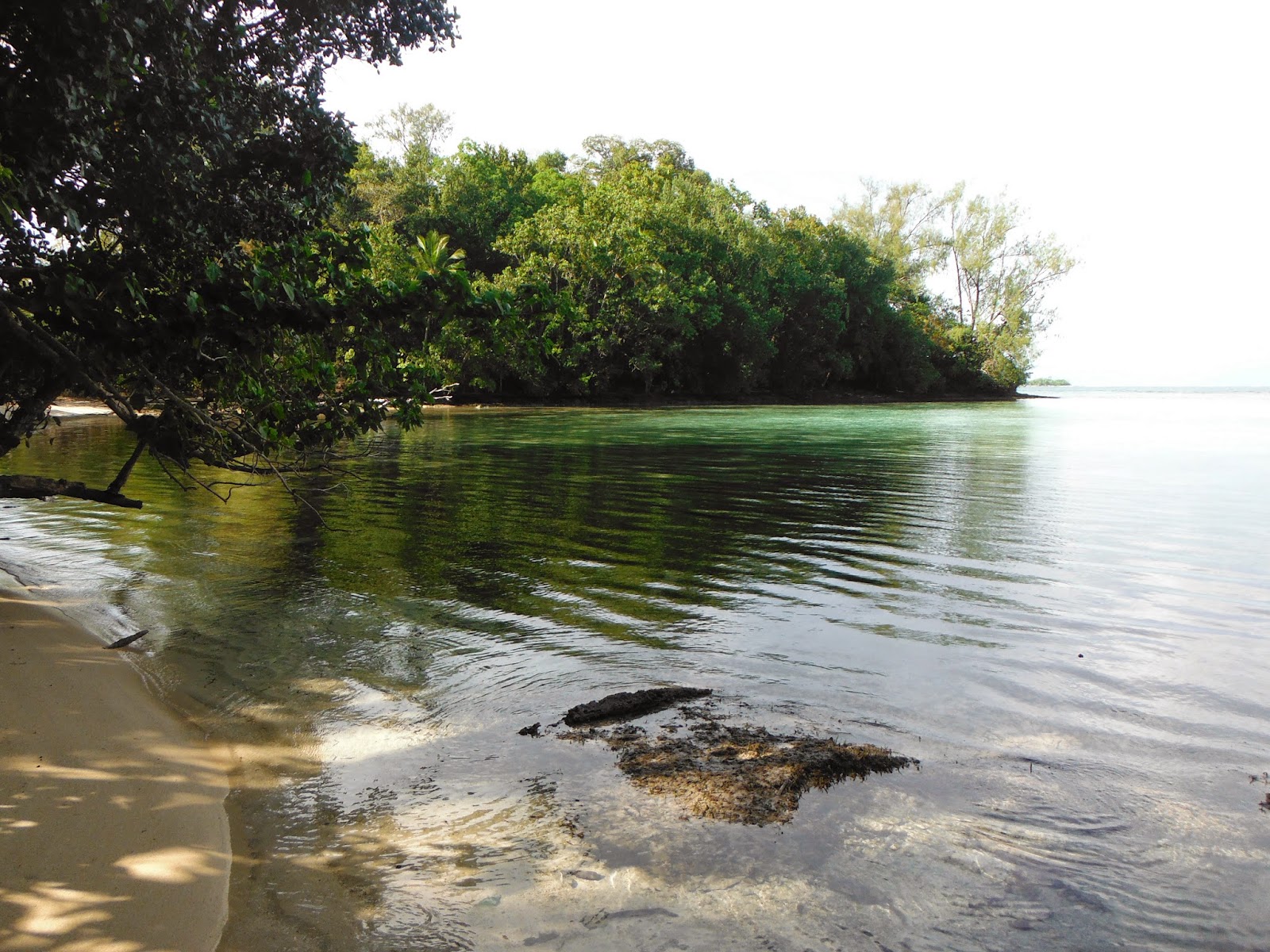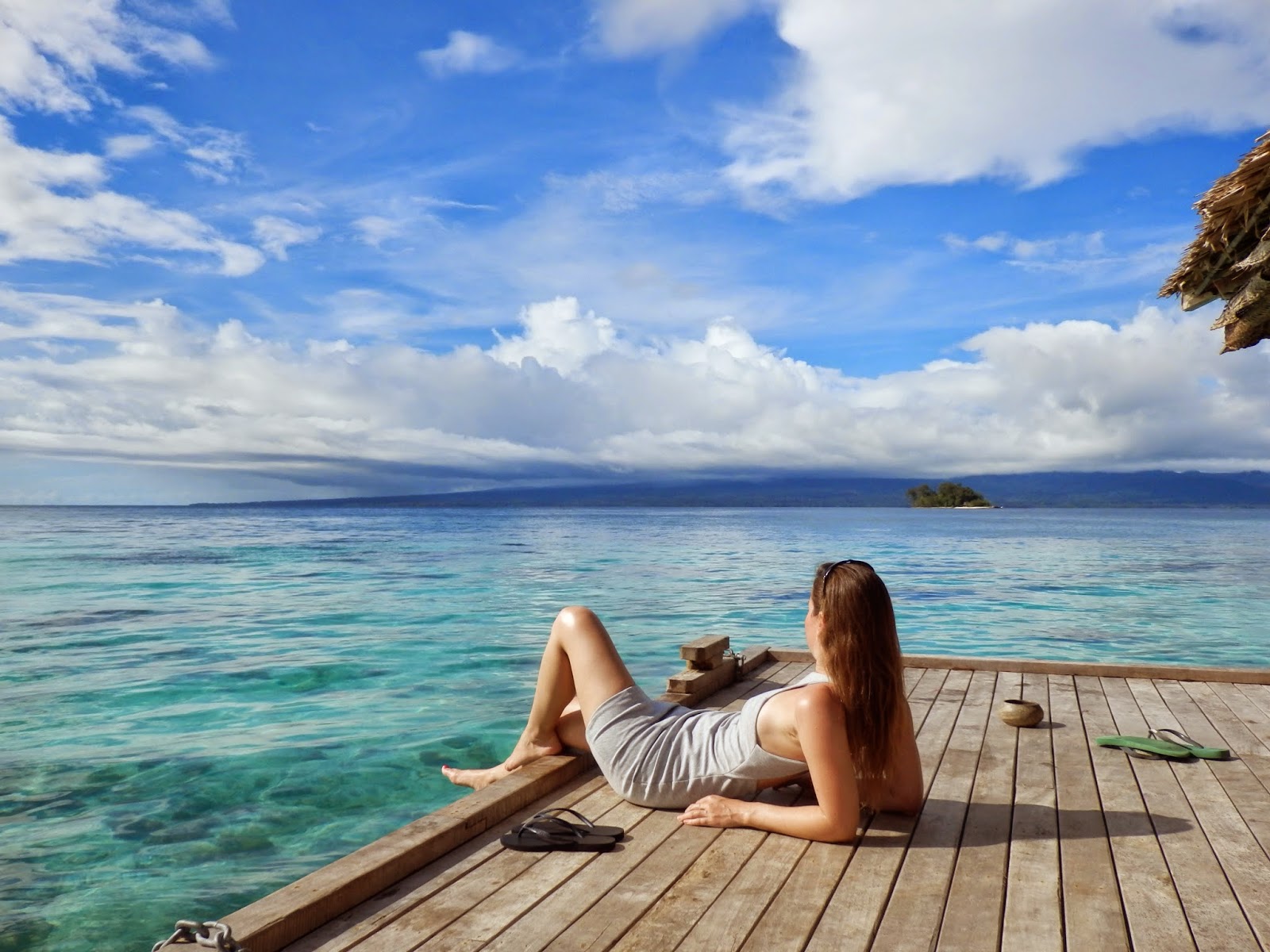The town of Gizo is the second largest in Solomon Islands, an archipelago country in the Pacific South of Papua New Guinea and North of Vanuatu.
Solomon is a very remote country only connected by flights from Brisbane, Port Moresby in Papua New Guinea and Fiji via Port Vila in Vanuatu. On most days there is a maximum of 1-2 flights landing and departing the capital of Honiara. Gizo is connected with Honiara with daily flights from Solomon Airlines which may sometimes have stopovers on the way.
 |
| Flying over Solomon island, a constant of dreamy corals and dotted with islands |
Flying over the archipelago from Honiara is a truly beautiful sight with all the little islands and corals seen from the air in all hues of blue and turquoise.
The airstrip in Ghizo archipelago is on a small island and you need to then take a boat to make it into the main town of Gizo. Other than a small hut the "airport" is just the landing strip.
Flying over towards Gizo I was getting more and more excited to land on those absolutely postcard perfect islands. I just could not wait to laze on the beach.
Honiara was such a disappointment. Apart from a few WWII places of interest, if you can find them, the capital had little to offer to visitors. It is barren, dirty and in the days I was there, wet which made it all unpleasantly muddy. My legs and feet were covered in mud almost the entire time. There are no tourists in sight, not one, and very few places to stay or eat. Once you get out of the main part of town roads are no longer paved and finding you way to your destination can be challenging: no signs, no pavement, very little civilisation and very very underdeveloped.
 |
| Our humble beach hut |
Ghizo archipelago was a very pleasant surprise. We bought tickets in the airline's office in Honiara for the following day. I have never used travel agencies so much as during my time in the Pacific, in 2012! There are only a couple of accommodation options: very basic, nice and high end.We settled for the middle option which looked very pretty in the photos. The hotel was made of bamboo huts on the beach and a larger construction at the end of a jetty where meals and almost every other facility was.
We were picked up by the hotel from the airstrip by the Rastafarian brothers wearing long rastas, reggae colours and looking like they were taken from a Bob Marley video clip. They packed our suitcases in the small boat and took us to the hotel only a short ride away.
 |
| The hotels' jetty |
When we arrived it was exactly as in the photos: uncomplicated but stunningly beautiful. I could spend hours staring at that blue ocean, the coals, the fish, the pal trees swinging in the wind. And there we were, almost entirely on our own in this slice of paradise unknown to the rest of the world.
 |
| Snorkeling, an underwater paradise |
There is not much one can do in Ghizo other than diving, having some walks in and around town and chilling. And that is exactly what we did. Reading on the veranda, watching the sea change from light blue to dark blue, seeing the day go by, eating the freshest of seafood, exploring the little island the hotel was on, kayakaing to a nearby island, swimming and watching the most incredible starry nights.
 |
| Lagon at the back part of the island |
There was no internet, barely any electricity and limited choices of food based on what the local produce and fishermen caught. Being in such a remote place it was expected and we truly did not mind to eat lobster every day and to be disconnected from the rest of the world! It was absolutely blissful island life.
On our last evening we decided to splash and visit the nearby higher end hotel Sanbis for dinner. They had internet and I was in much need of connecting to reorganise my next trip to Vanuatu the day after.
 |
| Diving trip to nearby corals/islands |
Sanbys was a slightly more luxurious place than Fatboys where we were staying. It featured a few American tourists, a pool table, an outdoor veranda, and open air restaurant and a few nice rooms. The owners and the guests mingled as if everybody was part of the same family. It was cosy and homey.
While we were having dinner it started to pour down in a very dramatic way only tropical islands experience. Water was coming from all sides, the wind was pushing the rain in every direction and the drops were hitting the bamboo roofs hard. So we waited and waited enjoying our wine until it became quite late and we realised we had no choice but to brave the weather and make it back to our hotel for the short night.
 |
| The views from the hotel's jetty |
We donned raincoats the hotel lent us and jumped on the boat. Needless to say we got soaked, completely. But we didn't care because the trip was one of the most memorable moments I have ever experiences. As we left the hotel's pier we found ourselves in the most absolute darkness only with the stars as witnesses of the beautiful natural phenomenon in front of us: luminescent plankton all around us illuminating as we sailed through as if someone had turned on the Christmas tree lights.
Rain pouring down and the sea lit by thousands of small little creatures made me feel like I was in a dream from which I never wanted to wake up. Despite getting more and more soaked the longer the ride I did not want it to end. Ghizo got under my skin.
I fell asleep with that beautiful image which was temporarily disturbed by the practicalities if having to re-pack, all our clothes completely drenched in water.
 |
| Our beach hut |
But that was not the only magical memory Ghizo left on us. On our last morning, as we readied to leave and we settling the bill we experienced two more incredible moments. One positive and one sad.
The fishermen were bringing their daily catch to the hotel's pier to sell to the chef and we saw that, in their boat, aside from fresh fish they had also caught a sting ray and a turtle! The turtle was still alive as the fishermen can only catch it and put it in the boat upside down so it is completely incapable of moving. We we shocked as well as saddened by the situation. On one side the fishermen skills were admirable. Despite common perception of turtles being slow animals sea turtles are incredibly fast. If you have ever tried to chase one while diving or snorkeling you will know that it is virtually impossible. Yet that fisherman had managed to swim faster than it, hug it from behind and bring it into the boat. On the other, this was a stark reminder of life in the most remote and naturally rich parts of the world here subsistence and customer prevail over conservation.
 |
| The fishermen's boat |
To the fisherman the turtle was a very important source of income and his effort and training to catch it an admirable skill worth rewarding. To us this was an extremely saddening image that made us wonder how many more turtles would follow the same fate.
Thankfully our last image of Ghizo was a pod of dolphins who accompanied us to the airport as we were riding the waves from the hotel. It was a much more beautiful image to be left with as the friendly animals played in the water next to us.
Have you been to Solomon? And to Ghizo Archipelago?
Are you looking to go? Let me know if you would like any tips or recommendations


No comments:
Post a Comment